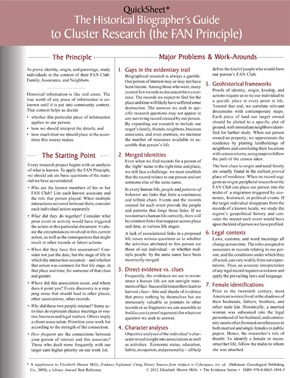 Elizabeth Shown Mills, is an expert researcher and family historian. Her works include top selling books on proving and citing sources: Evidence!: Citation & Analysis for the Family Historian and Evidence Explained, Evidence Explained: Citing History Sources from Artifacts to Cyberspace. Mills has also written a number of Quicksheets covering research methodologies designed to improve the accuracy and success of the overall research process. One such guide especially useful researchers concerned with the accuracy of their findings, which should be all genealogists, is Quicksheet: The Historical Biographer’s Guide to Cluster Research (the FAN Principle). The FAN Principle takes research past the initial discovery stage and helps the research learn to process information for accuracy and the resolution of contradictions.
Elizabeth Shown Mills, is an expert researcher and family historian. Her works include top selling books on proving and citing sources: Evidence!: Citation & Analysis for the Family Historian and Evidence Explained, Evidence Explained: Citing History Sources from Artifacts to Cyberspace. Mills has also written a number of Quicksheets covering research methodologies designed to improve the accuracy and success of the overall research process. One such guide especially useful researchers concerned with the accuracy of their findings, which should be all genealogists, is Quicksheet: The Historical Biographer’s Guide to Cluster Research (the FAN Principle). The FAN Principle takes research past the initial discovery stage and helps the research learn to process information for accuracy and the resolution of contradictions.
In the Biographer’s guide, Mills suggests studying individuals based on their “FAN Club: Family Associates, and Neighbors.” She explains, “historical information is like real estate. The true worth of any piece of information is unknown until it is put into community context.” Accordingly the context helps answer key questions:
- Does a piece of information actually apply to the person of study?
- How are the details to be interpreted?
- How accurate is the source and its contents?
This guide starts by helping the reader think, or rethink, their approach to research. The author suggests every project begins with an analysis of what is know, and suggests some questions to help uncover the best starting point. Then the guide looks at seven major problems and suggested approaches. The second page is dedicated to applying the principles of cluster research to common resources.
Page three examines the “Problem-Solving Spiral,” focusing on the idea that research is not a linear process. Finally, the guide uses the imagery of a target to determine closeness or proximity of those who might have or left information regarding the focus individual. Overall, the concepts teach that research is a process of thoughtful planning, searching information, and analyzing resources with an sharp focus or the core individual of biographical study.
Contents
The Principle
The Starting Point
Major Problems & Work-Arounds
- Gaps in the evidentiary trail
- Merged identities
- Direct evidence vs. clues
- Character analyses
- Geohistorical frameworks
- Legal contexts
- Female identifications
Applying the Principle to Common Resources
- Animal registers
- Estray registers
- Mark-and-brand registers
- Cemeteries
- Censuses
- Church registers
- Court cases
- Deeds
- Field notes, grants, land-entry files, patents, and surveys
- Immigration rolls
- Landownership maps
- Muster rolls, military records, and pension files
- Petitions
- Road orders
- Tax rolls
- War-time and frontier damage claims
The Problem-Solving Spiral
Targeted Research Using the FAN Principle
Order Quicksheet: The Historical Biographer’s Guide to Cluster Research (the FAN Principle), from Family Roots Publishing; Item #: GPC3868, Price: $8.77.
See other Quicksheets available at Family Roots Publishing:
QuickSheet: Citing Online African-American Historical Resources
QuickSheet: Citing Online Historical Resources
QuickSheet: Citing Ancestry.com Databases & Images
QuickSheet: The Historical Biographer’s Guide to the Research Process
QuickSheet: The Historical Biographer’s Guide to Finding People in Databases & Indexes
QuickSheet: Genealogical Problem Analysis, A Strategic Plan